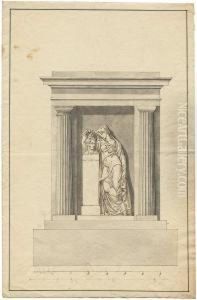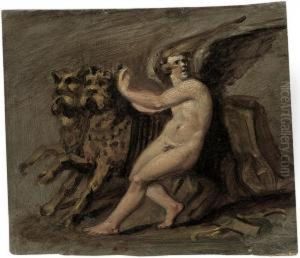Christian Friedrich Tieck Paintings
Christian Friedrich Tieck, born on August 14, 1776, in Berlin, was a notable German sculptor of the early 19th century and an important representative of the Romantic movement in art. He was the younger brother of the famous Romantic poet Ludwig Tieck. Tieck developed a passion for sculpture at an early age and went on to study at the Academy of Arts in Berlin, where he was influenced by the neoclassical style prevalent at the time.
Tieck's early work was characterized by his classical training, but he soon began to incorporate the Romantic ideals of emotional expression and individualism into his sculptures. In 1799, he traveled to Italy, which was a common practice among artists seeking to refine their skills and find inspiration. During his time in Italy, Tieck was deeply influenced by the works of the Renaissance masters, and he spent a significant amount of time in Rome, which was a hub for artists from across Europe.
Throughout his career, Tieck contributed to various significant projects, including the decoration of the Schauspielhaus Berlin, designed by the renowned architect Karl Friedrich Schinkel. Tieck's sculptures often depicted mythological and allegorical subjects, as well as portraits of contemporary figures. His style evolved to reflect the Romantic spirit of the age, emphasizing the expression of inner feelings and the beauty of nature.
Tieck's work was well received, and he became a respected member of the artistic community. He was appointed a member of the Prussian Academy of Arts and received commissions from various German states. Despite his success, he did not achieve the same level of fame as some of his contemporaries, such as Johann Gottfried Schadow, with whom he occasionally collaborated.
Christian Friedrich Tieck's contributions to sculpture and the Romantic movement were significant, and his works can be found in various museums and collections today. His legacy is that of an artist who bridged the gap between neoclassicism and Romanticism, bringing emotional depth and individuality to his sculptures. Tieck passed away on May 24, 1851, in Berlin.

